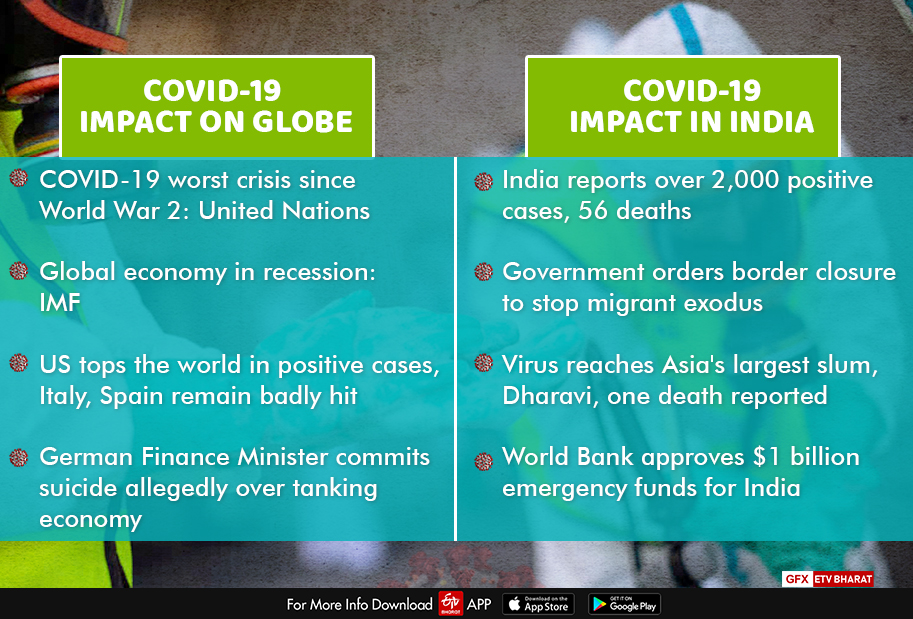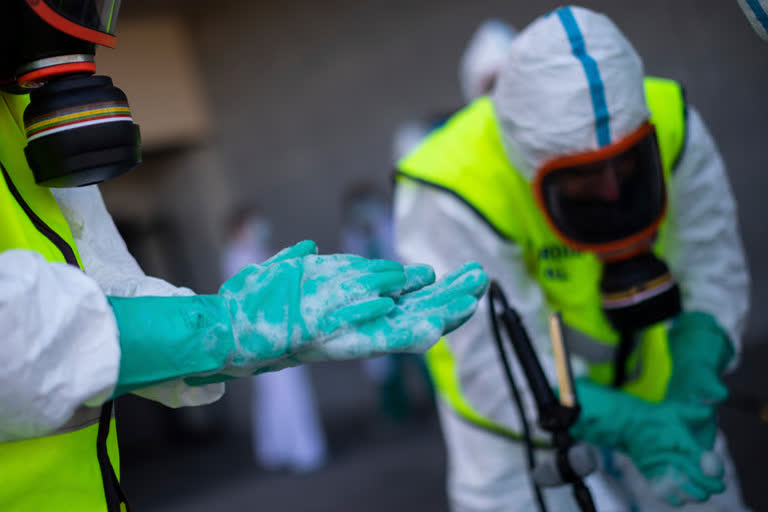Hyderabad: As COVID-19 spreads across multiple countries infecting around one million, we take a look at the four things to know about the novel coronavirus.
How COVID-19 is impacting India and the globe
After the Tablighi Jamaat connection to coronavirus cases in India exploded, India's total active cases crossed 2,000.
The total number of confirmed cases so far stands at 2,069, as per the data released by the Union Ministry of Health and Family Welfare. Maharashtra remains the most affected state with 335 confirmed cases. The national capital has a total of 219 confirmed cases.
The number of confirmed coronavirus cases globally has crossed the 1 million mark, according to the new tally from Johns Hopkins University.
A total of 1,015,403 people have been diagnosed with the novel coronavirus across the world, with a death toll of 53,030, while 210,579 others have recovered, Xinhua news agency cited the tally updated by the university's Center for Systems Science and Engineering.
The US has reported the highest number of cases, at 245,213, along with 5,983 deaths. Italy, with overall 115,242 cases, accounts for the highest number of deaths at 13,915.
In terms of the number of cases, Spain comes third with 112,065 infections, while it has the second-highest death toll after Italy with 10,348 fatalities.

Why WHO is deeply concerned
World Health Organisation is deeply concerned as the number of deaths has spiked in recent weeks with a major chunk of those casualties coming from Spain and Italy.
In order to progress towards universal health coverage, the World Health Organisation (WHO) has come up with new user guide for countries to expand the access to essential medicines by developing their own national essential medicines lists based on their needs and requirements.
Read: One out of 10 infected are healthcare workers: WHO
According to WHO, in order to achieve universal health coverage and achieve access for all by 2030, at least two billion people will need to have access to essential health services by 2030.
As innovative new medicines are increasingly patented around the world and are thus available only at monopoly prices that prevent widespread access, a public policy response is needed to address the intellectual property challenges associated with essential treatments.
How SKorea contained the virus spread
Seoul handled the first 30 cases in a steady and diligent manner. But, when 31st COVID-19 patient identified, it suddenly turned the tables.
Addressing a virtual World Economic Forum COVID Task Force meeting, South Korean Foreign Minister Kang Kyung-wha said, "After that, it just exploded. Containing the spread became difficult. Our sense of crisis at that time was like the sense of crisis in many European countries who are fighting the infection today – a feeling of being overwhelmed."
Read: SKorea's battle to contain COVID-19 is worth emulating
The 31st patient, also known as super-spreader, passed the infection to a larger number of people before her diagnosis by travelling to crowded cities like Daegu and Seoul.
In South Korea testing was made mandatory and it, in turn, became absolutely critical with a fast-travelling virus like this. So far 350,000 cases were tested, and for some patients, tests were conducted many times before they are released.
Unlike the US, Italy, the UK, South Korea did not go for a lockdown. However, it went for closing down of schools.
COVID-19 and seasonal flu: The differences
COVID-19, cold and the flu are respiratory illnesses that spread from person to person. While COVID-19 and flu share some similar symptoms, the symptoms of flu tend to occur faster and can have greater variation. But COVID-19 is more likely to lead to severe illness or death.



